Unit 3 Could you please tell me where the restrooms are? SectionB reading 课件(共26张PPT)
文档属性
| 名称 | Unit 3 Could you please tell me where the restrooms are? SectionB reading 课件(共26张PPT) | 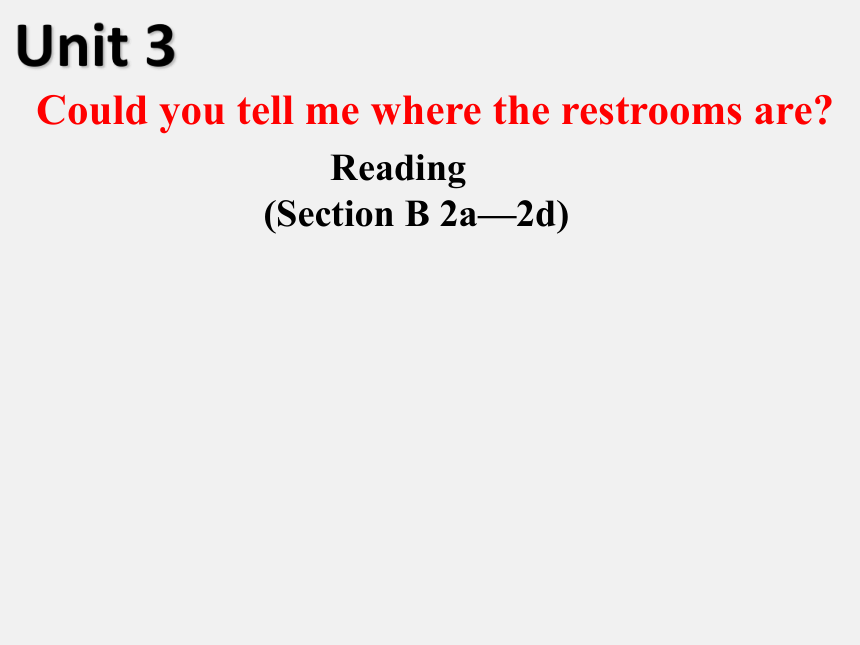 | |
| 格式 | zip | ||
| 文件大小 | 1.5MB | ||
| 资源类型 | 教案 | ||
| 版本资源 | 人教新目标(Go for it)版 | ||
| 科目 | 英语 | ||
| 更新时间 | 2021-09-26 11:02:19 | ||
图片预览

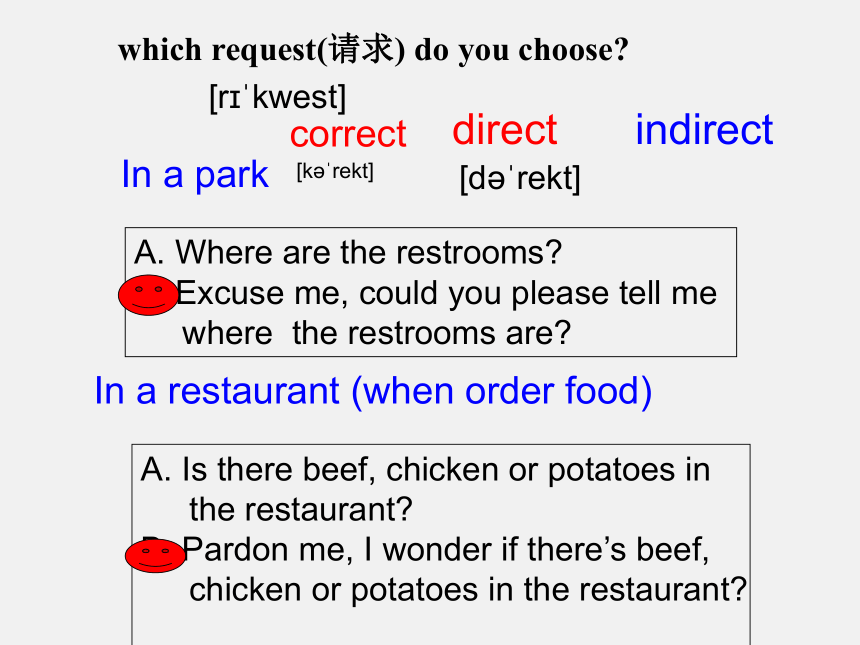
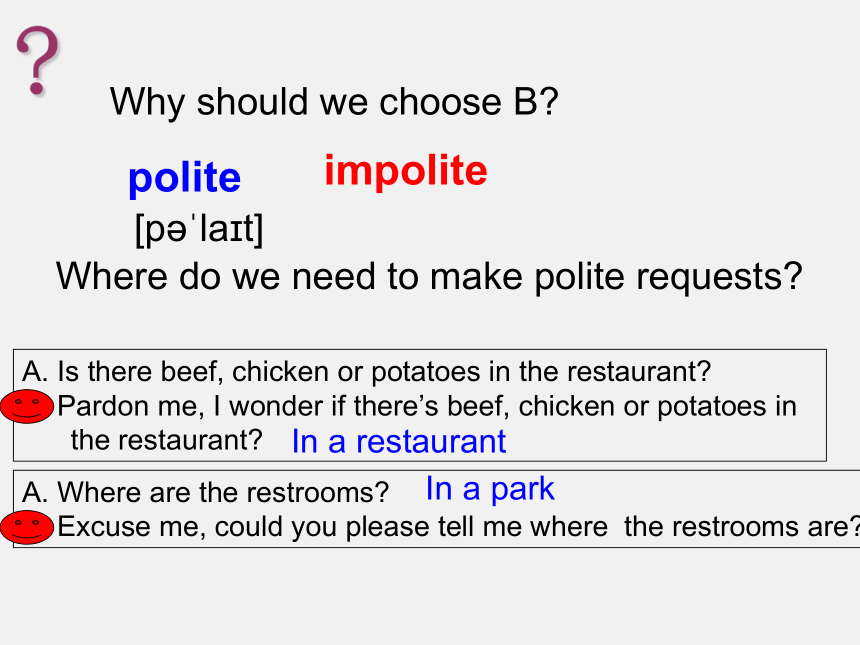
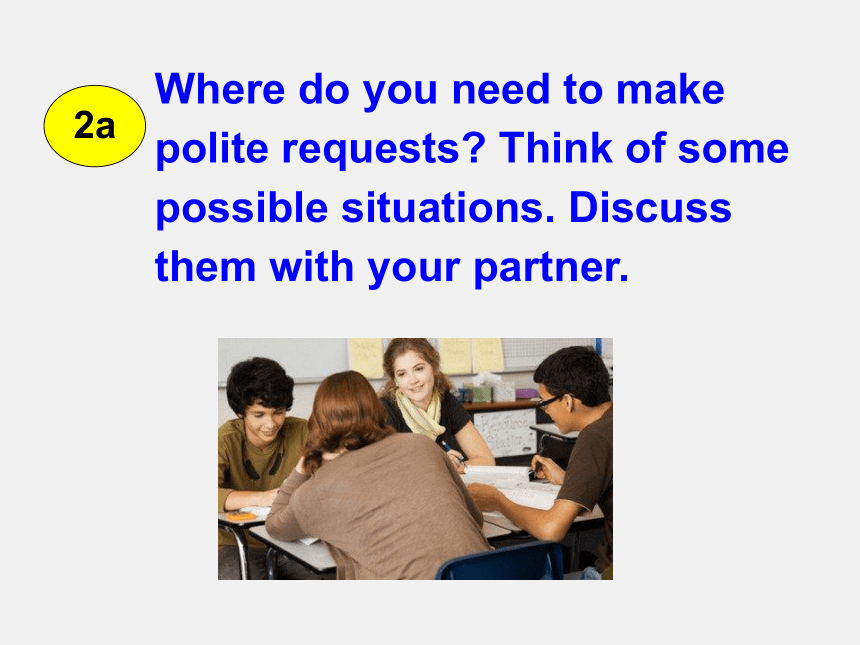
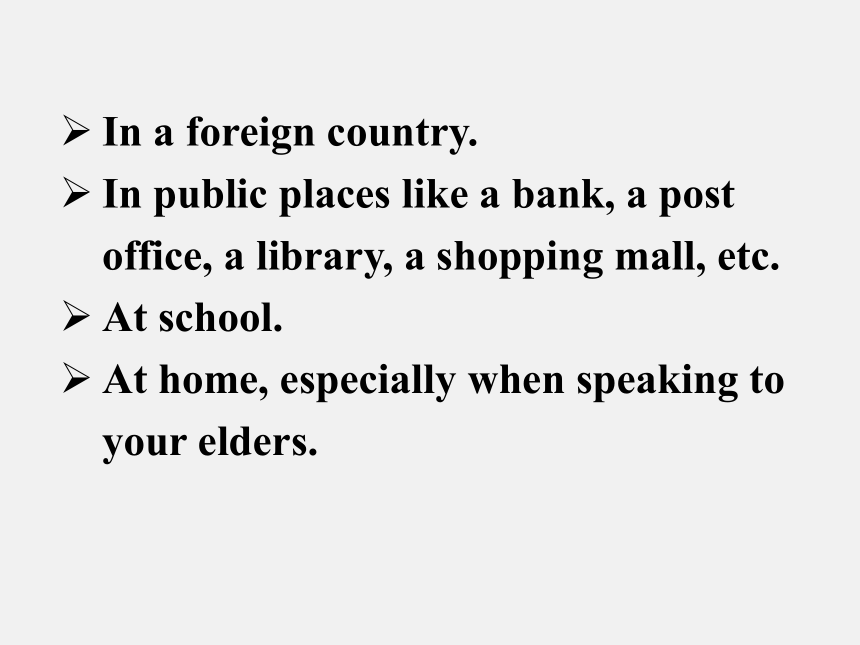
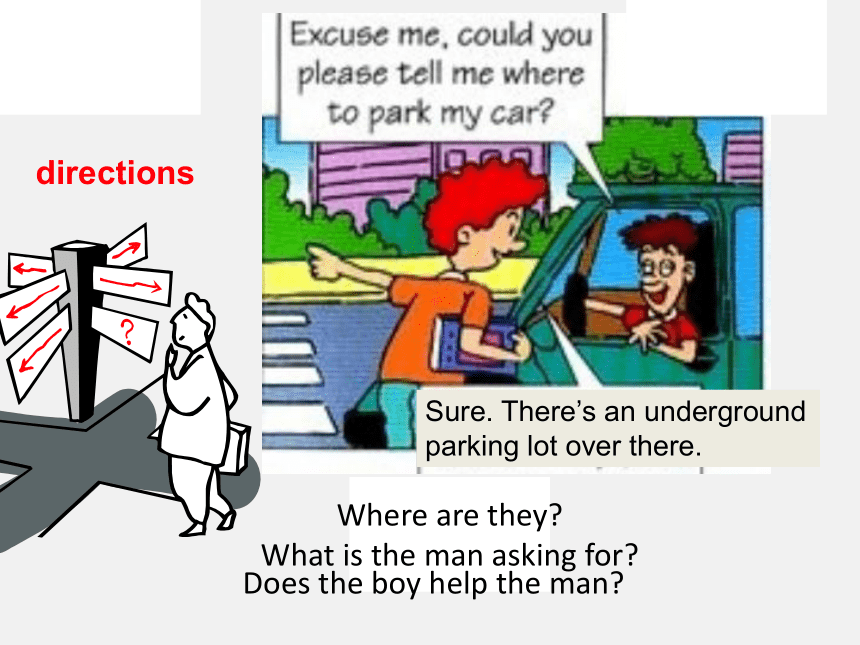

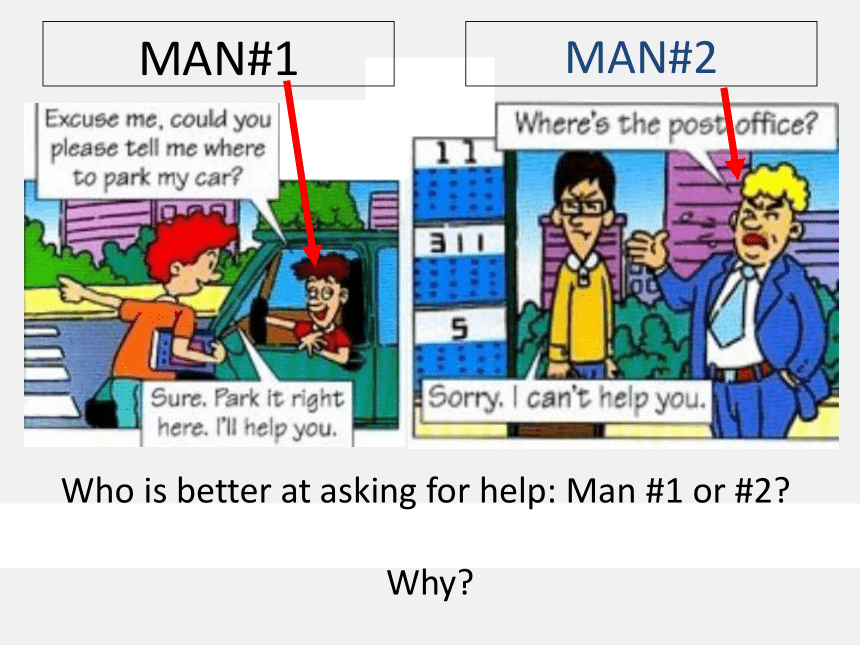
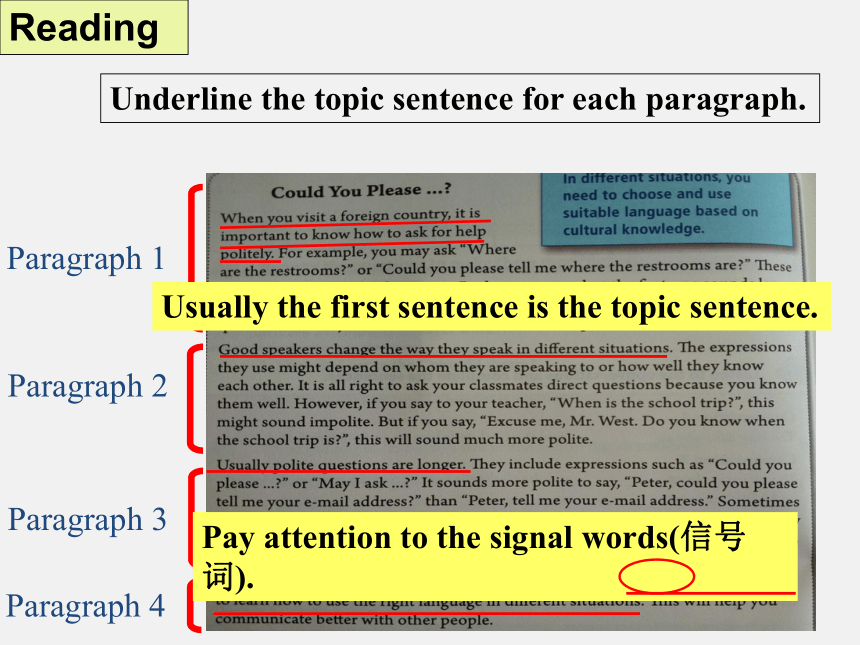
文档简介
(共26张PPT)
Could
you
tell
me
where
the
restrooms
are?
Unit
3
Reading
(Section
B
2a—2d)
which
request(请求)
do
you
choose?
A.
Where
are
the
restrooms?
B.
Excuse
me,
could
you
please
tell
me
where
the
restrooms
are?
A.
Is
there
beef,
chicken
or
potatoes
in
the
restaurant?
B.
Pardon
me,
I
wonder
if
there’s
beef,
chicken
or
potatoes
in
the
restaurant?
In
a
restaurant
(when
order
food)
In
a
park
direct
indirect
correct
[r??kwest]
[k??rekt]
[d??rekt]
Why
should
we
choose
B?
A.
Is
there
beef,
chicken
or
potatoes
in
the
restaurant?
B.
Pardon
me,
I
wonder
if
there’s
beef,
chicken
or
potatoes
in
the
restaurant?
A.
Where
are
the
restrooms?
B.
Excuse
me,
could
you
please
tell
me
where
the
restrooms
are?
?
impolite
polite
Where
do
we
need
to
make
polite
requests?
In
a
restaurant
In
a
park
[p??la?t]
2a
Where
do
you
need
to
make
polite
requests?
Think
of
some
possible
situations.
Discuss
them
with
your
partner.
In
a
foreign
country.
In
public
places
like
a
bank,
a
post
office,
a
library,
a
shopping
mall,
etc.
At
school.
At
home,
especially
when
speaking
to
your
elders.
Where
are
they?
What
is
the
man
asking
for?
Does
the
boy
help
the
man?
Sure.
There’s
an
underground
parking
lot
over
there.
directions
Do
they
look
happy?
Why
not?
MAN#1
MAN#2
Who
is
better
at
asking
for
help:
Man
#1
or
#2?
Why?
Paragraph
1
Paragraph
4
Paragraph
3
Paragraph
2
Usually
the
first
sentence
is
the
topic
sentence.
Pay
attention
to
the
signal
words(信号词).
Reading
Underline
the
topic
sentence
for
each
paragraph.
How
to
speak
to
foreigners
when
they
visit
your
country.
b)
How
you
should
ask
for
things
differently
in
different
situations.
c)
How
being
polite
will
make
you
a
better
person
and
help
you
make
friends.
What’s
the
passage
mainly
about?
Find
all
the
direct
questions
and
polite
requests
from
the
passage.
Direct
questions
Polite
requests
Where
are
the
restrooms?
1.
Could
you
please
tell
me
where
the
restrooms
are?
2.
When
is
the
school
trip?
3.
Peter,
tell
me
your
e-mail
address.
2.
Excuse
me,
Mr.
West.
Do
you
know
when
the
school
trip
is?
3.
Peter,
could
you
please
tell
me
your
e-mail
address?
Para.
1:
It
is
important
to
know
how
to
make
requests
politely.
Q1:
Is
it
enough
to
make
requests
correctly?
Q2:
What
else
do
we
need
to
learn?
Two
requests
:
1.______________________________
2.______________________________
They
are
similar
requests
for
the
________.
The
first
one
is
a________question.
It
sounds
less
polite.
If
we
want
to
ask
politely,
we
need
to
use
_________
questions.
Where
are
the
restrooms?
Could
you
please
tell
me
where
the
restrooms
are?
directions
direct
indirect
Reading
1.
It
is
necessary
to
ask
indirect
questions
to
all
the
people
around
us.
2.
We
can
ask
direct
questions
to
our
classmates
or
friends.
3.
We
should
ask
indirect
questions
to
our
teachers
or
a
stranger.
It
will
be
more
polite.
Para.
2:
Good
speakers
change
the
way
they
speak
in
different
situations.
Check
“True”
or
“False”.
F
T
T
Can
you
help
me
with
my
homework?
Excuse
me,
could
you
please
help
me
with
my
homework?
The
expressions
you
use
might
depend
on
w_____
you
are
speaking
to
or
how
w____
you
know
each
other.
你所使用的表述或许取决于你正在与谁交谈,以及与谈话者之间的熟悉程度。
hom
ell
Para.
3:
Usually
polite
questions
are
longer.
What
words
can
we
use
to
make
polite
questions?
Please
circle
those
“magic
words”.
Usually
polite
questions
are
longer.
They
include
the
expressions
such
as
“Could
you
please…?”
or
“May
I
ask…?”
It
sounds
more
polite
to
say,
“Peter,
tell
me
your
e-mail
address.”
Sometimes
we
even
need
to
spend
time
leading
to
a
request.
For
example,
we
might
first
say
to
a
stranger,
“Excuse
me,
I
wonder
if
you
can
help
me”
or
“I’m
sorry
to
trouble
you,
but…”before
asking
for
help.
Can
you
help
the
man
make
a
more
polite
request
by
using
the
“magic
words”
?
Para.4:
It
is
important
to
learn
how
to
use
the
right
language
in
different
situations.
It
might
seem
more
difficult
to
speak
politely.
However,
it
is
important
to
learn
how
to
use
the
right
language
in
different
situations.
This
will
help
you
communicate
better
with
other
people.
Q:
What
does
“this”
refer
to(指的是)?
When
you
visit
a
foreign
country,
it
is
important
to
know
how
to
ask
for
help
______.
It
isn’t
enough
to
just
ask
a
question
_______.
We
also
need
to
learn
how
___
___
______
when
we
ask
for
help.
Fill
in
the
blanks
according
to
the
passage.
politely
correctly
to
be
polite
Read
and
complete
the
summary.
Good
speakers
______
the
way
they
speak
in
different
_________.
The
expressions
they
use
might
______
____
whom
they
are
speaking
to
or
how
well
they
know
______
_____.
It’s
all
right
to
ask
______
questions
to
your
classmates.
Usually
polite
questions
are
_______.
They
_______
expressions
such
as
“Could
you
please.”
or
“Can
I
ask…”
It
_____
more
polite.
Sometimes
we
even
need
to
spend
time
_____
into
a
request.
change
situations
depend
on
each
other
direct
longer
include
sounds
leading
It
might
seem
more
difficult
to
speak
________
than
_________.
However,
it
is
important
to
learn
how
to
use
the
right
language
in
different
situations.
This
will
also
help
you
__________
better
with
other
people.
politely
directly
communicate
1.
提出礼貌的要求
2.
听起来更礼貌
3.
一个很直接的问题
4.
请求帮助
5.
在不同的情形下
make
polite
requests
sound
more
polite
in
different
situations
ask
for
help
a
very
direct
question
Revision
6.
取决于
7.
你所用的表达方式
8.
比如
9.
花时间导入
10.
变得更擅长
become
better
at
spend
time
leading
in
such
as/for
example
the
expressions
you
use
depend
on
Reading
Extension
A
Polite
Request
If
you
park
your
car
in
the
wrong
place,
a
traffic
policeman
will
soon
find
it.
You
will
be
very
lucky
if
he
lets
you
go
without
a
ticket.
However,
this
does
not
always
happen.
Traffic
police
are
sometimes
very
polite.
During
a
holiday
in
Sweden,
I
found
this
note
on
my
car:
‘Sir,
we
welcome
you
to
our
city.
This
is
a
“No
Parking”
area.
You
will
enjoy
your
stay
here
if
you
pay
attention
to
our
street
signs.
This
note
is
only
a
reminder.’
If
you
receive
a
request
like
this,
you
cannot
fail(未能做到)
to
obey
it!
Answer
the
questions
Q2:
Where
did
the
writer
spend
his
holiday?
Q1:
What
will
happen
if
you
park
your
car
in
a
wrong
place?
Q3:
Did
the
writer
enjoy
his
holiday?
Sweden.
A
traffic
policeman
will
soon
find
it.
Tongue
is
not
steel
but
it
cuts.
Hold
your
tongue.
Homework
Read
the
passage
and
memorize
the
new
words
and
phrases.
2.
Read
the
passage
and
finish
2d.
Could
you
tell
me
where
the
restrooms
are?
Unit
3
Reading
(Section
B
2a—2d)
which
request(请求)
do
you
choose?
A.
Where
are
the
restrooms?
B.
Excuse
me,
could
you
please
tell
me
where
the
restrooms
are?
A.
Is
there
beef,
chicken
or
potatoes
in
the
restaurant?
B.
Pardon
me,
I
wonder
if
there’s
beef,
chicken
or
potatoes
in
the
restaurant?
In
a
restaurant
(when
order
food)
In
a
park
direct
indirect
correct
[r??kwest]
[k??rekt]
[d??rekt]
Why
should
we
choose
B?
A.
Is
there
beef,
chicken
or
potatoes
in
the
restaurant?
B.
Pardon
me,
I
wonder
if
there’s
beef,
chicken
or
potatoes
in
the
restaurant?
A.
Where
are
the
restrooms?
B.
Excuse
me,
could
you
please
tell
me
where
the
restrooms
are?
?
impolite
polite
Where
do
we
need
to
make
polite
requests?
In
a
restaurant
In
a
park
[p??la?t]
2a
Where
do
you
need
to
make
polite
requests?
Think
of
some
possible
situations.
Discuss
them
with
your
partner.
In
a
foreign
country.
In
public
places
like
a
bank,
a
post
office,
a
library,
a
shopping
mall,
etc.
At
school.
At
home,
especially
when
speaking
to
your
elders.
Where
are
they?
What
is
the
man
asking
for?
Does
the
boy
help
the
man?
Sure.
There’s
an
underground
parking
lot
over
there.
directions
Do
they
look
happy?
Why
not?
MAN#1
MAN#2
Who
is
better
at
asking
for
help:
Man
#1
or
#2?
Why?
Paragraph
1
Paragraph
4
Paragraph
3
Paragraph
2
Usually
the
first
sentence
is
the
topic
sentence.
Pay
attention
to
the
signal
words(信号词).
Reading
Underline
the
topic
sentence
for
each
paragraph.
How
to
speak
to
foreigners
when
they
visit
your
country.
b)
How
you
should
ask
for
things
differently
in
different
situations.
c)
How
being
polite
will
make
you
a
better
person
and
help
you
make
friends.
What’s
the
passage
mainly
about?
Find
all
the
direct
questions
and
polite
requests
from
the
passage.
Direct
questions
Polite
requests
Where
are
the
restrooms?
1.
Could
you
please
tell
me
where
the
restrooms
are?
2.
When
is
the
school
trip?
3.
Peter,
tell
me
your
address.
2.
Excuse
me,
Mr.
West.
Do
you
know
when
the
school
trip
is?
3.
Peter,
could
you
please
tell
me
your
address?
Para.
1:
It
is
important
to
know
how
to
make
requests
politely.
Q1:
Is
it
enough
to
make
requests
correctly?
Q2:
What
else
do
we
need
to
learn?
Two
requests
:
1.______________________________
2.______________________________
They
are
similar
requests
for
the
________.
The
first
one
is
a________question.
It
sounds
less
polite.
If
we
want
to
ask
politely,
we
need
to
use
_________
questions.
Where
are
the
restrooms?
Could
you
please
tell
me
where
the
restrooms
are?
directions
direct
indirect
Reading
1.
It
is
necessary
to
ask
indirect
questions
to
all
the
people
around
us.
2.
We
can
ask
direct
questions
to
our
classmates
or
friends.
3.
We
should
ask
indirect
questions
to
our
teachers
or
a
stranger.
It
will
be
more
polite.
Para.
2:
Good
speakers
change
the
way
they
speak
in
different
situations.
Check
“True”
or
“False”.
F
T
T
Can
you
help
me
with
my
homework?
Excuse
me,
could
you
please
help
me
with
my
homework?
The
expressions
you
use
might
depend
on
w_____
you
are
speaking
to
or
how
w____
you
know
each
other.
你所使用的表述或许取决于你正在与谁交谈,以及与谈话者之间的熟悉程度。
hom
ell
Para.
3:
Usually
polite
questions
are
longer.
What
words
can
we
use
to
make
polite
questions?
Please
circle
those
“magic
words”.
Usually
polite
questions
are
longer.
They
include
the
expressions
such
as
“Could
you
please…?”
or
“May
I
ask…?”
It
sounds
more
polite
to
say,
“Peter,
tell
me
your
address.”
Sometimes
we
even
need
to
spend
time
leading
to
a
request.
For
example,
we
might
first
say
to
a
stranger,
“Excuse
me,
I
wonder
if
you
can
help
me”
or
“I’m
sorry
to
trouble
you,
but…”before
asking
for
help.
Can
you
help
the
man
make
a
more
polite
request
by
using
the
“magic
words”
?
Para.4:
It
is
important
to
learn
how
to
use
the
right
language
in
different
situations.
It
might
seem
more
difficult
to
speak
politely.
However,
it
is
important
to
learn
how
to
use
the
right
language
in
different
situations.
This
will
help
you
communicate
better
with
other
people.
Q:
What
does
“this”
refer
to(指的是)?
When
you
visit
a
foreign
country,
it
is
important
to
know
how
to
ask
for
help
______.
It
isn’t
enough
to
just
ask
a
question
_______.
We
also
need
to
learn
how
___
___
______
when
we
ask
for
help.
Fill
in
the
blanks
according
to
the
passage.
politely
correctly
to
be
polite
Read
and
complete
the
summary.
Good
speakers
______
the
way
they
speak
in
different
_________.
The
expressions
they
use
might
______
____
whom
they
are
speaking
to
or
how
well
they
know
______
_____.
It’s
all
right
to
ask
______
questions
to
your
classmates.
Usually
polite
questions
are
_______.
They
_______
expressions
such
as
“Could
you
please.”
or
“Can
I
ask…”
It
_____
more
polite.
Sometimes
we
even
need
to
spend
time
_____
into
a
request.
change
situations
depend
on
each
other
direct
longer
include
sounds
leading
It
might
seem
more
difficult
to
speak
________
than
_________.
However,
it
is
important
to
learn
how
to
use
the
right
language
in
different
situations.
This
will
also
help
you
__________
better
with
other
people.
politely
directly
communicate
1.
提出礼貌的要求
2.
听起来更礼貌
3.
一个很直接的问题
4.
请求帮助
5.
在不同的情形下
make
polite
requests
sound
more
polite
in
different
situations
ask
for
help
a
very
direct
question
Revision
6.
取决于
7.
你所用的表达方式
8.
比如
9.
花时间导入
10.
变得更擅长
become
better
at
spend
time
leading
in
such
as/for
example
the
expressions
you
use
depend
on
Reading
Extension
A
Polite
Request
If
you
park
your
car
in
the
wrong
place,
a
traffic
policeman
will
soon
find
it.
You
will
be
very
lucky
if
he
lets
you
go
without
a
ticket.
However,
this
does
not
always
happen.
Traffic
police
are
sometimes
very
polite.
During
a
holiday
in
Sweden,
I
found
this
note
on
my
car:
‘Sir,
we
welcome
you
to
our
city.
This
is
a
“No
Parking”
area.
You
will
enjoy
your
stay
here
if
you
pay
attention
to
our
street
signs.
This
note
is
only
a
reminder.’
If
you
receive
a
request
like
this,
you
cannot
fail(未能做到)
to
obey
it!
Answer
the
questions
Q2:
Where
did
the
writer
spend
his
holiday?
Q1:
What
will
happen
if
you
park
your
car
in
a
wrong
place?
Q3:
Did
the
writer
enjoy
his
holiday?
Sweden.
A
traffic
policeman
will
soon
find
it.
Tongue
is
not
steel
but
it
cuts.
Hold
your
tongue.
Homework
Read
the
passage
and
memorize
the
new
words
and
phrases.
2.
Read
the
passage
and
finish
2d.
同课章节目录
- Unit 1 How can we become good learners.
- Section A
- Section B
- Unit 2 I think that mooncakes are delicious!
- Section A
- Section B
- Unit 3 Could you please tell me where the restroom
- Section A
- Section B
- Unit 4 I used to be afraid of the dark.
- Section A
- Section B
- Unit 5 What are the shirts made of?
- Section A
- Section B
- Review of Units 1-5
- Unit 6 When was it invented?
- Section A
- Section B
- Unit 7 Teenagers should be allowed to choose their
- Section A
- Section B
- Unit 8 It must belong to Carla.
- Section A
- Section B
- Unit 9 I like music that I can dance to.
- Section A
- Section B
- Unit 10 You're supposed to shake hands.
- Section A
- Section B
- Review of Units 6-10
- Unit 11 Sad movies make me cry.
- Section A
- Section B
- Unit 12 Life is full of the unexpected
- Section A
- Section B
- Unit 13 We're trying to save the earth!
- Section A
- Section B
- Unit 14 I remember meeting all of you in Grade 7.
- Section A
- Section B
- Review of Units 11-14
